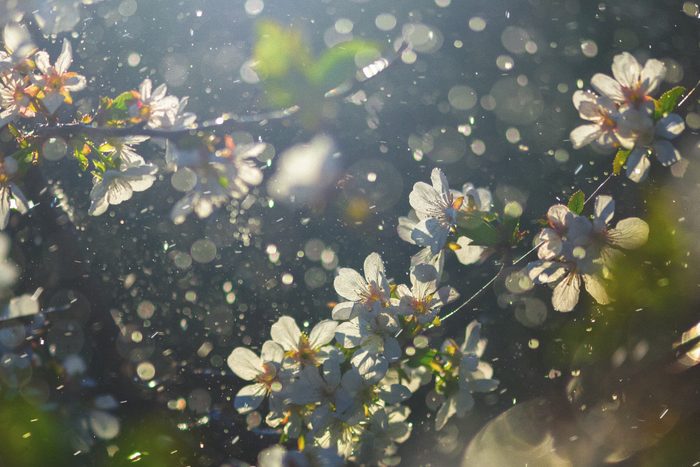An Allergist Says Seasonal Allergies Really Are Worse Than Ever This Year—Here’s Why
Updated: May 05, 2022

Is this allergy season the worst ever? Recent figures suggest 50 million Americans are suffering from an allergy season that's longer and more severe—and also affecting more of us—than ever before. Here are six simple tips to help manage your allergy symptoms.
One major reason allergies are worse in 2022
If your sniffling, sneezing, watery eyes, and other seasonal allergy symptoms seem worse than ever this year, you’re not imagining it. Many of the 50 million Americans who suffer from allergy symptoms know that seasonal allergies tend to stir up in spring, summer, and early fall and are typically caused by pollens from trees, grasses or weeds, or mold spores.
However, human-made conditions, such as carbon dioxide from burning coal, gasoline, and natural gas, are causing plants to produce even more pollen. Neeta Ogden, MD, an allergist and immunologist in Edison, New Jersey and spokesperson for the American College of Allergy, Asthma, and Immunology (ACAAI) explains: “As the earth gets warmer, we see conditions that are optimal for plant growth and soaring pollen counts, which worsens your symptoms.”
As a result, even people who have never suffered from allergies are feeling the effects. An April 2022 HealthDay poll of more than 2,000 U.S. adults found that while one in three people had an official hay fever diagnosis, three of four said they have experienced seasonal allergy symptoms—with close to 75 percent saying that these symptoms are taking a toll on their overall quality of life.
And next year may be even worse. For a March 2022 study published in Nature Communications, researchers looked at 15 plant pollens in the U.S. and historical pollen data from 100 locations across North America. Then, they used computer simulations to calculate how long the allergy season might span, and how pollen emissions will change as temperatures rise during the next 80 years.
Amir Shahlaee, MD, an allergist in Annandale, VA, helps translate some of the study’s findings. “There has been a trend of longer and more intense warm seasons attributed to climate change, and this naturally means more people getting exposed to pollen, longer,” Dr. Shahlaee tells The Healthy. In fact, the latest research suggests that pollen season may start 10 to 40 days earlier and last anywhere from one to three weeks longer than in the past. Further, pollen levels may triple in some locations if carbon emissions aren’t curbed.
“How can I manage my allergies this year?”
You aren’t powerless in the face of high pollen counts—Ogden suggests a few simple steps:
- Check pollen counts before you leave the house. Check out the National Allergy Bureau for pollen counts in your area. Pollen counts are reported as low, moderate, high, or very high. “Avoid being outside on days with high or very high pollen counts, especially on windy days,” Ogden says.
What Is the Pollen Count? 3 Best Ways to Check
- Check in with an allergist. Find out exactly what you are allergic to so you can be better prepared and know when to start taking medication, says Susan Schuval, MD, chief of the Division of Pediatric Allergy at Stony Brook Children’s Hospital in New York. If you know the allergens that are most likely to trigger you, you may opt for an over-the-counter antihistamine or nasal spray to help with sneezing, decongestants that can treat a stuffy nose, and antihistamine eye drops which can relieve watery, itchy eyes. If these don’t do the trick, allergy shots may help.
7 Sneaky Signs Your Allergy Medicine Isn’t Working
- Run a HEPA filter. HEPA filters—short for “high-efficiency particulate air” filters—can remove at least 99.97% of particles that are 0.3 microns in diameter from the air, including pollen. Looking for a good recommendation? One of our sibling sites, Family Handyman, recently reviewed the Honeywell Air Purifier.
- Remove your shoes before walking into your home. Make sure guests do the same. This simple step can minimize the pollen that gets dragged in from outside and stays harbored in carpets, area rugs, and the air.
- Wear a mask when gardening or doing yardwork. This will help you avoid excessive exposure to pollen.
- Keep the windows closed. That means in the car, too.
- Take a bath, wash your hair, and change your clothing. Especially before bed, this will help you get rid of errant pollen.
How Often Should You Wash Your Sheets? Here’s What Germ Experts Recommend
Get the wellness intel you need every day from The Healthy @Reader’s Digest newsletter. Follow us on Facebook and Instagram, and keep reading:
- Brooke Shields Exclusive: Her 4 Wellness Must-Haves and the “Extraordinary” Privilege of Aging
- Science Explains Why Menthol Cigarettes Are More Addictive
- Healing My Gut with Probiotics Relieved My Depression: I Tried It
- The 4 Best Vitamin D Supplements Depending on Your Specific Needs, from Registered Dietitians
- The 10 Best Health Books of 2022: Therapists and Readers Rate the Bestselling Wellness Books So Far This Year













